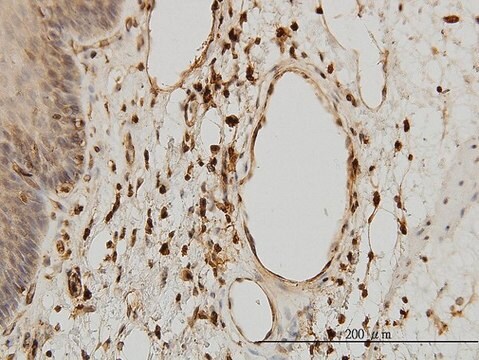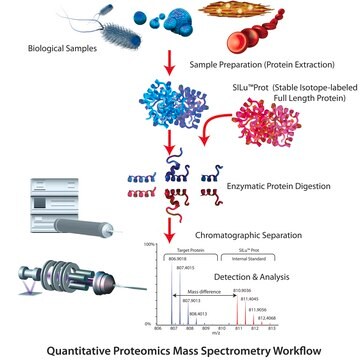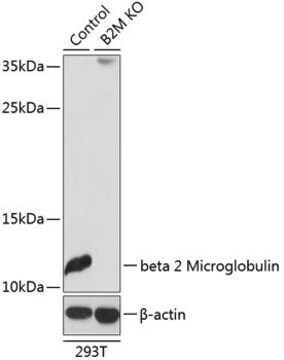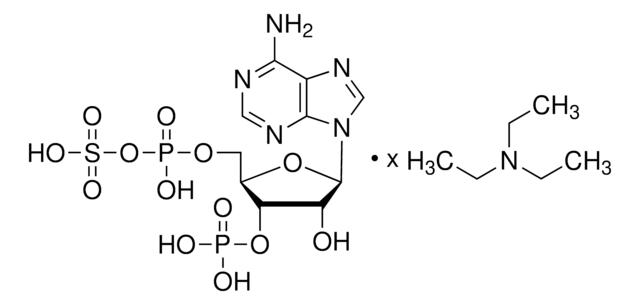M7398
Monoclonal Anti-β2-Microglobulin antibody produced in mouse
clone BM-63, ascites fluid
Faça loginpara ver os preços organizacionais e de contrato
About This Item
Produtos recomendados
fonte biológica
mouse
Nível de qualidade
conjugado
unconjugated
forma do anticorpo
ascites fluid
tipo de produto de anticorpo
primary antibodies
clone
BM-63, monoclonal
peso molecular
antigen 12 kDa
contém
15 mM sodium azide
reatividade de espécies
human
técnica(s)
indirect ELISA: 1:1000
indirect immunofluorescence: 1:500 using human PBL′s
Isotipo
IgG1
nº de adesão UniProt
Condições de expedição
dry ice
temperatura de armazenamento
−20°C
modificação pós-traducional do alvo
unmodified
Informações sobre genes
human ... B2M(567)
Descrição geral
β-2-microglobulin is part of the human leukocyte antigen, where it represents the light chain. It is expressed on cell membranes and is made up of 99 amino acids. β-2-microglobulin is part of the immunoglobulin superfamily. β−2-Microglobulin is a membrane glycoprotein of mammalian nucleated cells including lymphocytes.
Monoclonal anti-β-2-Microglobulin (mouse IgG1 isotype) is derived from the hybridoma produced by the fusion of mouse myeloma cells and splenocytes from an immunized mouse.
Imunogênio
human β2-microglobulin and a lysate of a lymphoblastoid cell line.
Aplicação
Monoclonal Anti-β2-Microglobulin antibody produced in mouse has been used in ELISA and immunofluorescent labelling.
Ações bioquímicas/fisiológicas
β-2-microglobulin acts as a tumor marker and has been shown to be associated with dialysis-related amyloidosis. It may function as a structural part of the MHC Class I molecule.
Microglobulin may be elevated in the serum or urine of patients with systemic lupus erythematosus (SLE), rheumatoid arthritis, metal toxications, some viral infections and possibly malignant disorders and AIDS.
Exoneração de responsabilidade
Unless otherwise stated in our catalog or other company documentation accompanying the product(s), our products are intended for research use only and are not to be used for any other purpose, which includes but is not limited to, unauthorized commercial uses, in vitro diagnostic uses, ex vivo or in vivo therapeutic uses or any type of consumption or application to humans or animals.
Não está encontrando o produto certo?
Experimente o nosso Ferramenta de seleção de produtos.
Código de classe de armazenamento
10 - Combustible liquids
Classe de risco de água (WGK)
nwg
Ponto de fulgor (°F)
Not applicable
Ponto de fulgor (°C)
Not applicable
Escolha uma das versões mais recentes:
Já possui este produto?
Encontre a documentação dos produtos que você adquiriu recentemente na biblioteca de documentos.
The production, purification and crystallization of a soluble form of the nonclassical MHC HLA-G: the essential role of cobalt
Clements CS, et al.
Acta Crystallographica Section F, Structural Biology and Crystallization Communications, 62(1), 70-73 (2006)
Serum Beta 2-microglobulin/cystatin C index: a useful biomarker in lupus nephritis
Silva MVM, et al.
Nephron extra, 2(1), 169-176 (2012)
Alon Margalit et al.
Journal of immunology (Baltimore, Md. : 1950), 176(1), 217-224 (2005-12-21)
Level and persistence of antigenic peptides presented by APCs on MHC class I (MHC-I) molecules influence the magnitude and quality of the ensuing CTL response. We recently demonstrated the unique immunological properties conferred on APCs by expressing beta2-microglobulin (beta2m) as
A role for calnexin in the assembly of the MHC class I loading complex in the endoplasmic reticulum.
G Diedrich et al.
Journal of immunology (Baltimore, Md. : 1950), 166(3), 1703-1709 (2001-02-13)
Heterodimers of MHC class I glycoprotein and beta(2)-microglobulin (beta(2)m) bind short peptides in the endoplasmic reticulum (ER). Before peptide binding these molecules form part of a multisubunit loading complex that also contains the two subunits of the TAP, the transmembrane
Craig S Clements et al.
Acta crystallographica. Section F, Structural biology and crystallization communications, 62(Pt 1), 70-73 (2006-03-03)
HLA-G is a nonclassical class I major histocompatibility complex (MHC) molecule that is primarily expressed at the foetal-maternal interface. Although the role of HLA-G has not been fully elucidated, current evidence suggests it protects the foetus from the maternal immune
Nossa equipe de cientistas tem experiência em todas as áreas de pesquisa, incluindo Life Sciences, ciência de materiais, síntese química, cromatografia, química analítica e muitas outras.
Entre em contato com a assistência técnica








